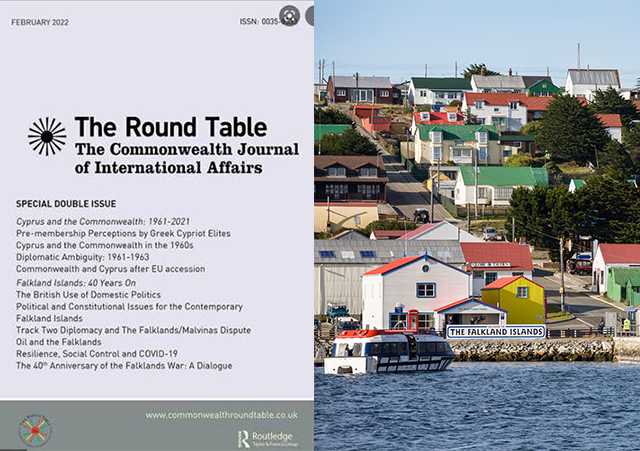
[These are two excerpts from the introduction to a special edition of The Round Table: The Commonwealth Journal of International Affairs.]
The Falklands War took place between 2 April and 14 June 1982. The ten-week conflict was precipitated by Argentina’s invasion first of the Falklands and then of South Georgia, both British overseas territories. Soon after, the British dispatched a naval task force to liberate them. At the end of the war, 649 Argentinians, 255 British, and three Falkland Islanders had died. There were many defining moments of the War, such as the Battle of Goose Green, a pivotal victory for the British; the sinking of HMS Sheffield, the first Royal Navy ship sunk in action since the Second World War; and the sinking of ARA General Belgrano, which saw 368 members of its crew lose their lives. Although there was some hesitancy on the part of the British Government whether to send a task force or not, Prime Minister Margaret Thatcher made the decision that it should, despite the obvious risks. Her resolve was fortified by the Chief of the Naval Staff, Admiral Sir Henry Leach, who advised that ‘Britain could and should send a task force’.
The aftermath of the War had a number of key consequences. The military government in Argentina, which was already in terminal decline, saw the last vestiges of support fall away, the junta collapsed, and its leader General Leopoldo Galtieri resigned on 18 June 1982. On the other hand, Britain’s victory helped revitalise the political and electoral prospects of Margaret Thatcher, who won a landslide victory in the general election held in June 1983; although the divided opposition certainly enhanced her winning margin. Finally, the Falklands Islands saw a significant improvement in its economic and constitutional position. Whereas before the War the Falklands was largely neglected by both Conservative and Labour governments in Britain, the post-War period saw substantial political, economic and social change, and as a result, the Falklands of today is quite different to the Falklands of 40 years ago. It is these matters that are primarily the focus of the special section.
The final article, a dialogue between Falkland Islanders and academics with an interest in the Falklands, considers the issue of memory and the act of remembrance, and the effect that the passage of time has on them both. The War continues to be the defining event in the history of the Falklands and remains current because of the enduring territorial dispute. This sharpens the role and importance of remembrance; also because much of the Falklands’ landscape is still shaped by the War (although the Islands becoming landmine-free in November 2020 was a key event). The dialogue offers a wide-ranging discussion and nuanced assessment of these issues, and it becomes clear that in some quarters the rawness of what happened very much remains. However, over the next two decades many Islanders who lived through the War and those that fought in the War will no longer be with us, and as the contributors make clear this is a crucial moment for memory, history, and education to come together, but this will be a challenge as in Britain and the Falklands (which follows the same national curriculum), little is formally taught about the War.
So, the aim of this special section, including the two opinion pieces, is to highlight the road travelled by the Falkland Islands over the last 40 years, and that is why there is limited consideration of Argentina, although it remains an ever-present influence and reference point. Of course over a limited number of contributions, we cannot provide an all-embracing review of the Falklands’ political, economic, and social evolution, but we can highlight key instances of that change. The 40th anniversary of the Falklands War is certainly a chance to reflect back, but also a prime opportunity to showcase the major changes that have taken place, which make the Falkland Islands a much different place today than it was four decades ago.
Peter Clegg and Kate Matheson are at the University of the West of England, Bristol, UK.



